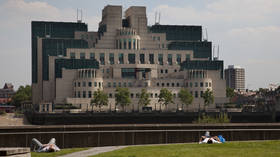New ‘Licence to Kill’ bill shows UK is happy to let its spies break the law – while lecturing other countries how to behave

A bill giving Britain’s security services the green light to break the law is passing through parliament. It’s another abuse of government power that a compliant media is unwilling to question.
The British Parliament is in the process of pushing through a new law, with the consent of the Labour Party leadership. Perfectly normal, right? Except that this legislation has quite huge implications.
Titled the ‘Covert Human Intelligence Sources Bill,’ its purpose is to “authorise conduct by officials and agents of the security and intelligence services, law enforcement, and certain other public authorities, which would otherwise constitute criminality.”
That’s right, the security services of the United Kingdom are being given the green light to break the law, reducing the power of oversight and accountability behind what are already highly secret activities.
The mainstream media are not drawing serious attention to it, nor are they giving the bill any scrutiny. Although Sir Keir Starmer’s Labour Party agreed to pass the bill, he faced a rebellion from a cohort of 19 MPs, including former leader Jeremy Corbyn, who voted against it, arguing it is an abuse of government power and inherently dangerous.
MP for Coventry South Zarah Sultana stated: “I can’t support legislation that could give undercover state agents the licence to murder, torture and commit sexual violence.”
This evening I voted against the Covert Human Intelligence Sources Bill.I can't support legislation that could give undercover state agents the licence to murder, torture and commit sexual violence. pic.twitter.com/PK09NRP2dU
— Zarah Sultana MP (@zarahsultana) October 5, 2020
The bill marks the second time the Conservative government has sought to exonerate abuse of power from authorities with Labour’s support, with a bill legalising UK war crimes also passing through the House of Commons.
Once again, the United Kingdom believes that it is a law unto itself, which is hardly surprising coming from a government that believes Britannia still rules the waves. On one hand, it preaches the virtues of a democratic and open society, pointing fingers at countries implementing basic national security provisions and preaching ‘the rule of law,’ such as when addressing the situation in Hong Kong. But at the same time, it advocates a subtle mindset that its own actions in any capacity, even when much more questionable, are simply untouchable.
The latest act of parliament is simply the legal consolidation of a long established mentality that means the security establishment cannot truly be held to account, and it is best the public do not know about its activities.
Even before this new legislation, Britain’s intelligence services have long exempted themselves from meaningful scrutiny of their actions. The Five Eyes“PRISM” program, shared with Australia, Canada, New Zealand and the United States, is designed to counteract local privacy laws and legal constraints on government power by simply coordinating espionage activities and sharing the information.
Although defenders of this bill and the programme say it constitutes a common good – in terms of counter-terrorism, for example – they cannot say with absolute certainty that there will be no abuses of power, or more ‘political’ activities taking place.
The same people are equally likely to say that the ‘national security’ and ‘intelligence’ activities of countries such as China are always malign, oppressive and out of control, but is that the case at home too?
One of the most defining sagas of our time which suggests such is the fate of Julian Assange. Currently facing hearings over his extradition to America, his ‘crime’ is having revealed information about the activities of the US and Five Eyes intelligence around the world.
If he were Chinese or Russian, he would be heralded as a hero and glorified as a martyr. But for challenging the Western security establishment and their crimes, he’s merely considered a criminal and the Western media at large make a point of ignoring it, just as they do with this new bill authorizing criminal activity by the British security establishment.
In essence, the virtues of Western democracy do not appear to extend to challenging and scrutinizing covert, secret activities. Where is the transparency for MI5 and MI6? There is none.
And most unfortunate of all is the Labour Party leadership’s willingness to kowtow to this agenda. Under Sir Keir Starmer, the party is moving back towards the political centre and is eager to completely disregard the anti-establishment, anti-war and anti-imperialist policies of Jeremy Corbyn.
Also on rt.com UK security agencies have done ‘no planning or intel gathering’ on pandemic threats, despite ample warnings, analysis findsIn a manner very similar to Tony Blair, he is reintegrating the party back into the core of the Western security establishment and supporting the government’s positions on these matters. This has caused many within the party to lambast the leadership as a ‘controlled opposition’ – one similar to the Democrats in the United States, which does not oppose the government’s foreign policy or national security agenda whatsoever. Such bipartisanship ultimately serves to protect the agenda of the ‘deep state,’ as it is sometimes described, from any serious public scrutiny, buffered by mainstream media complicity.
In this case, Britannia is a law unto itself. The government is securing the absolute power and untouchability of the security services beyond the rule of law, and bar a few Labour MPs and followers on social media, there is not a whimper about it.
For a country that prides itself on such deep moral and political superiority over others, it is simply not open to serious discussion, spotlighting or scrutiny of its activities in a way its values endeavour to profess. One rule for me, another for thee.
Think your friends would be interested? Share this story!
The statements, views and opinions expressed in this column are solely those of the author and do not necessarily represent those of RT.














